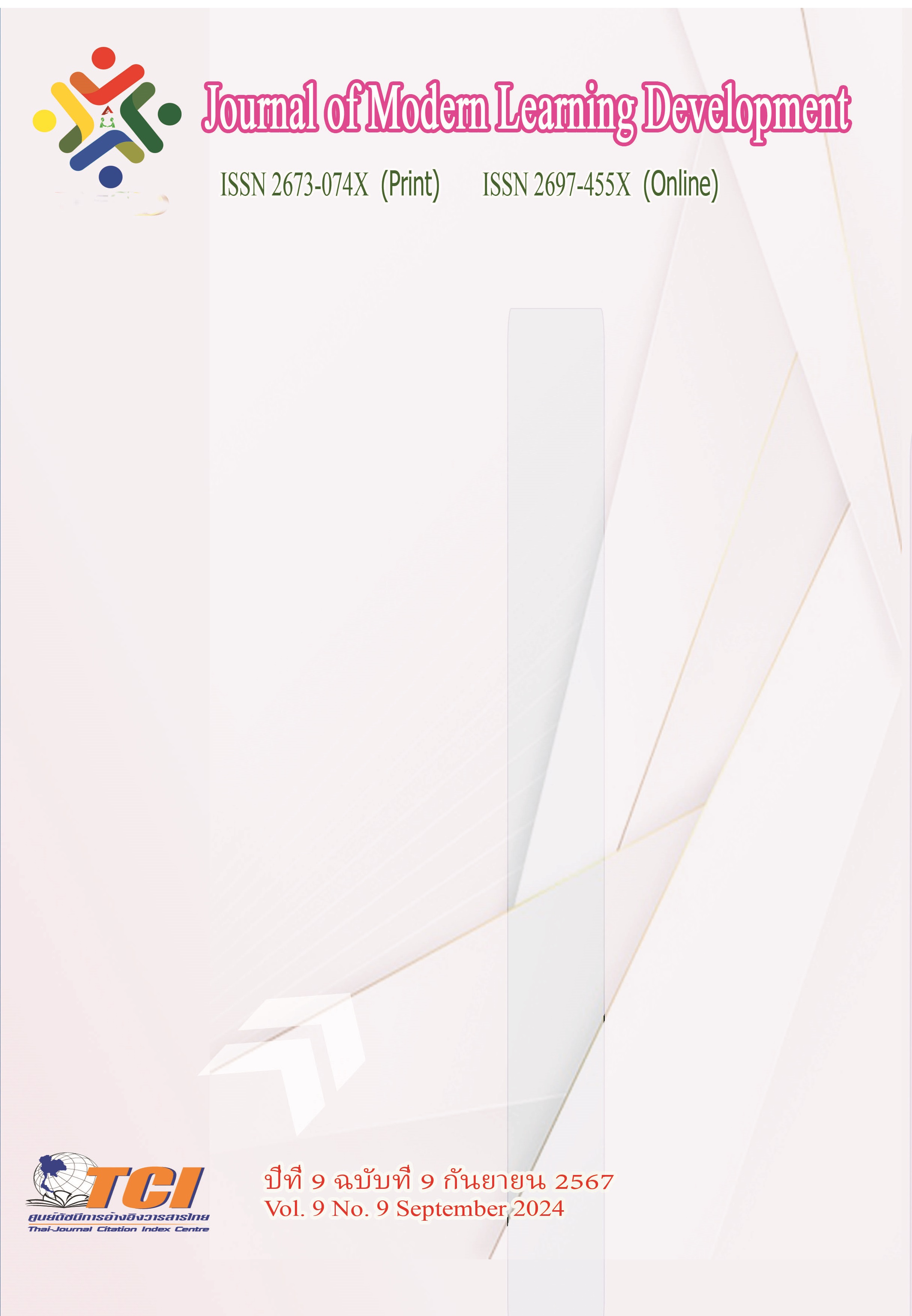การพัฒนาผลสัมฤทธิ์ทางการเรียนวรรณคดีไทยของนักเรียนชั้นมัธยมศึกษาปีที่ 6 ด้วยรูปแบบการจัดการเรียนรู้ MACRO Model ร่วมกับ เทคนิคการระดมสมอง Brain Writing
Main Article Content
บทคัดย่อ
การวิจัยครั้งนี้มีวัตถุประสงค์เพื่อ 1) เปรียบเทียบผลสัมฤทธิ์ทางการเรียนวรรณคดีไทยของนักเรียนชั้น มัธยมศึกษาปีที่ 6 ก่อนและหลังการจัดการเรียนรู้ตามรูปแบบ MACRO Model ร่วมกับเทคนิคการระดม สมองแบบ Brain Writing 2) ศึกษาความพึงพอใจของนักเรียนต่อการจัดการเรียนรู้ กลุ่มตัวอย่างในการวิจัย คือ นักเรียนชั้นมัธยมศึกษาปีที่ 6/6 โรงเรียนสอาดเผดิมวิทยา จังหวัดชุมพร ปีการศึกษา 2567 จานวน 44 คน ซึ่งได้มาด้วยวิธีการสุ่มแบบกลุ่ม (Cluster Random Sampling) โดยใช้ห้องเรียนเป็นหน่วยสุ่ม เครื่องมือ ที่ใช้วิจัย ได้แก่ 1) แผนการจัดการเรียนรู้โดยใช้รูปแบบการจัดการเรียนรู้ MACRO Model ร่วมกับเทคนิค การระดมสมอง Brain Writing จานวน 4 แผน 2) แบบทดสอบวัดผลสัมฤทธิ์ทางการเรียนวรรณคดีไทย และ 3) แบบสอบถามความพึงพอใจของนักเรียนที่มีต่อการจัดการเรียนรู้ การวิเคราะห์ข้อมูลโดยใช้ค่าเฉลี่ย (M)
ค่าส่วนเบี่ยงเบนมาตรฐาน (SD) และสถิติทดสอบ t-test แบบไม่เป็นอิสระต่อกัน (Dependent Samples t-test)
ผลการวิจัยพบว่า 1) ผลสัมฤทธิ์ทางการเรียนวรรณคดีไทยของนักเรียนชั้นมัธยมศึกษาปีที่ 6 หลังการ จัดการเรียนรู้ตามรูปแบบ MACRO Model ร่วมกับเทคนิคการระดมสมองแบบ Brain Writing สูงกว่าก่อน เรียนอย่างมีนัยสาคัญทางสถิติ ที่ระดับ .05 2) ความพึงพอใจของนักเรียนที่มีต่อการจัดการเรียนรู้ตามรูปแบบ MACRO Model ร่วมกับเทคนิคการระดมสมองแบบ Brain Writing ในภาพรวมอยู่ในระดับพึงพอใจมาก ที่สุด
Article Details
เอกสารอ้างอิง
จีรวรรณ สรบุญทอง. (2563). การศึกษาผลสัมฤทธิ์ทางการเรียนวรรณคดีไทยและทักษะการร่วมมือของนักเรียนชั้นมัธยมศึกษาปีที่ 1 ที่จัดการเรียนรู้ โดยใช้เทคนิคจิ๊กซอว์ 3 ร่วมกับการใช้คําถามพัฒนาการคิด. วิทยานิพนธ์ปริญญามหาบัณฑิต สาขาวิชาการสอนภาษาไทย. บัณฑิตวิทยาลัย: มหาวิทยาลัยศิลปากร.
ชนาธิป พรกุล. (2555). การออกแบบการสอน. (พิมพ์ครั้งที่ 3). กรุงเทพมหานคร: วีพริ้น.
ชัยวัฒน์ สุทธิรัตน์. (2559). การพัฒนาหลักสูตร ทฤษฎีสู่การปฏิบัติ. กรุงเทพมหานคร: วีพรินท์.
ดลชัย อินทรโกสุม. (2564). การพัฒนาผลสัมฤทธิ์ทางการเรียนวรรณคดี เรื่อง กลอนดอกสร้อยรำพึงในป่าช้าด้วยการจัดการเรียนรู้ตามรูปแบบ MACRO model ร่วมกับกระบวนการกลุ่ม สำหรับนักเรียนชั้นมัธยมศึกษาปีที่ 2. วิทยานิพนธ์ปริญญามหาบัณฑิต สาขาวิชาภาษาไทย. บัณฑิตวิทยาลัย:มหาวิทยาลัยนเรศวร.
ดิเรก วรรณเศียร. (2558). MACRO Model: รูปแบบการจัดการเรียนรู้สำหรับศตวรรษที่ 21. กรุงเทพมหานคร: มหาวิทยาลัยราชภัฏสวนดุสิต.
ธนพร เลิศโพธาวัฒนา. (2561). การพัฒนาความสามารถในการคิดวิเคราะห์และผลสัมฤทธิ:ทางการเรียน วิชาชีววิทยาเรื่องยีนและโครโมโซม โดยใช้รูปแบบการจัดการเรียนรู้สำหรับศตวรรษที่ 21: MACRO MODEL ของนักเรียนชั้นมัธยมศึกษาปีที่ 6. วิทยานิพนธ์ศิลปศาสตรมหาบัณฑิต สาขาวิชาการสอนวิทยาศาสตร์. บัณฑิตวิทยาลัย: มหาวิทยาลัยรังสิต.
นรรัชต์ ฝันเชียร. (2563). MACRO model โมเดลการสอนสู่ศตวรรษที่ 21. ออนไลน์. สืบค้นเมื่อ 15 มิถุนายน 2566. แหล่งที่มา: https://www.trueplookpanya.com/education/content /84985/- teamet-
นัฒริยา ปิ่นทอง. (2564). การพัฒนาผลสัมฤทธิ์ทางการเรียนวรรณคดี เรื่อง มัทนะพาธา ของนักเรียนชั้นมัธยมศึกษาปีที่ 5 ด้วยการจัดการเรียนรู้แบบบันได 5 ขั้น. วิทยานิพนธ์ปริญญามหาบัณฑิต สาขาวิชาการสอนภาษาไทย. บัณฑิตวิทยาลัย: มหาวิทยาลัยศิลปากร.
พิมพ์ชญา ธนาพรพงศ์สถิต. (2563). การพัฒนาแผนการจัดการเรียนรู้วิชาภาษาไทย โดยใช้รูปแบบสมองเป็นฐานของนักเรียนที่มีความบกพร่องทางสติปัญญาโรงเรียนสุพรรณปัญญานุกูล. วารสารวิทยาการจัดการปริทัศน์. 22 (2), 95-108.
วัชรภัทร เตชะวัฒนศิริดํารง. (2565). ปัจจัยที่ส่งผลต่อการจัดการนวัตกรรมในชั้นเรียนของครูโรงเรียนพื้นที่นวัตกรรมการศึกษาจังหวัดระยอง. สิกขา วารสารศึกษาศาสตร์. 9 (2), 41.
สอาดเผดิมวิทยา. (2565). คะแนนผลสัมฤทธิ์ทางการเรียน ปีการศึกษา 2565. งานทะเบียนและวัดผลโรงเรียนสอาดเผดิมวิทยา. 12 ธันวาคม 2566. โรงเรียนสอาดเผดิมวิทยา: ชุมพรการพิมพ์.
สุเทพ อ่วมเจริญ และประเสริฐ มงคล. (2559). การพัฒนารูปแบบการเรียนรู้เพื่อสร้างความรู้ของนักศึกษาวิชาชีพครู. นครปฐม: คณะศึกษาศาสตร์ มหาวิทยาลัยศิลปากร.
อนงค์นาถ ทนันชัย. (2563). การใช้เทคนิคการจัดการเรียนรู้เชิงรุกเพื่อพัฒนาทักษะการนำเสนอของนักศึกษาในรายวิชาการนำเสนอผลงานทางธุรกิจ. วารสารคณะมนุษย์ศาสตร์และสังคมศาสตร์ มหาวิทยาลัยราชภัฏนครปฐม. 7 (1), 51.
อรวรรณ สุขอุดม. (2564). ผลการจัดการเรียนรู้แบบสร้างสรรค์เป็นฐาน (CBL) ร่วมกับสื่ออินโฟกราฟิกที่มีต่อผลสัมฤทธิ์ทางการเรียนวรรณคดีไทย ของนักเรียนชั้นมัธยมศึกษาปีที่ 1. วิทยานิพนธ์ปริญญาการศึกษามหาบัณฑิต สาขาวิชาภาษาไทย. บัณฑิตวิทยาลัย: มหาวิทยาลัยนเรศวร.
อุเทน ปัญโญ. (2556). ระเบียบวิธีวิจัย. เชียงใหม่: มหาวิทยาลัยนอร์ท-เชียงใหม่.
Indriyani, V. (2023). Asynchronous vs Synchronous: Effects of Online Learning on Students' Oral Presentation Skills. Journal of Education Technology. 8 (1), 165-174.
Paulus, P. B., & Yang, H. C. (2000). Idea Generation in Groups: A Basis for Creativity in Organizations Organizational Behavior and Human Decision Processes. 82 (1), 76-87.
Rohrbach, B. (1969). 'Creative by Rules: Method 635, a New Technique for Solving Problems. Absatzwirtschaft. 12, 73-75.
Sintawati Yulianti. (2019). IMPROVING STUDENTS’ WRITING SKILL USING BRAINS WRITING STRATEGY. Professional journal of English education. 2 (5), 714-721.
Suardika, I. K. (2023). The Use of Oral Presentation Techniques to Improve Communication Skills in Social Studies Learning. TA’DIB JOURNAL. 26 (2).
Syifana, A. T. (2019). Improving The students’ writing skill by using Brainwriting 6-3-5 technique among the eighth grade at Mts Muhammadiyah Bumi Nabung State. Institute For Islamic Studies Of Metro.
Tiong Yoke Nee. (2021). Learning Using Brainwriting Methods In Helping Students Master Writing Skills. Universiti Sains Islam Malaysia. 6 (2), 39-50.


